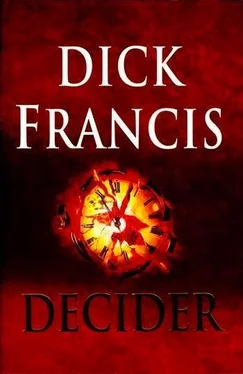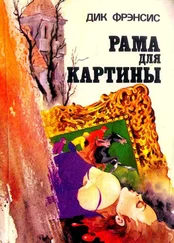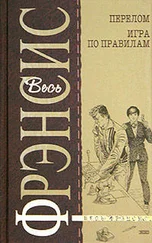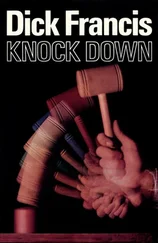I left the bus outside the Gardner house and with Roger walked to the stands.
‘I’m not invited to the meeting,’ he said as if it were a relief, ‘but I’ll show you to the door.’
He took me up a staircase, round a couple of corners, and through a door marked Private into a carpeted world quite different from the functional concrete of the public areas. Silently pointing to panelled and polished double-doors ahead, he gave me an encouraging pat on the shoulder and left me, rather in the manner of a colonel avuncularly sending a rookie into his first battle.
Regretting my presence already, I opened one of the double-doors and went in.
I’d gone to the meeting in business clothes (grey trousers, white shirt, tie, navy blazer) to present a conventional boardroom appearance. I had a tidy normal haircut, the smoothest of shaves, clean fingernails. The big dusty labourer of the building sites couldn’t be guessed at.
The older men at the meeting all wore suits. Those more my own age and younger hadn’t bothered with such formality. I had, I thought in satisfaction, hit it just right.
Although I had arrived at the time stated in the solicitor’s letter, it seemed that the Strattons had jumped the clock. The whole tribe were sitting round a truly imposing Edwardian dining table of old French-polished mahogany, their chairs newer, nineteen-thirtyish, like the grandstands themselves.
The only one I knew by sight was Rebecca, the jockey, dressed now in trousers, tailored jacket and heavy gold chains. The man sitting at the head of the table, grey-haired, bulky and authoritative, I took to be Conrad, the fourth and latest baron.
He turned his head to me as I went in. They all, of course, turned their heads. Five men, three women.
‘I’m afraid you are in the wrong place,’ Conrad said with scant politeness. ‘This is a private meeting.’
‘Stratton shareholders?’ I asked inoffensively.
‘As it happens. And you are...?’
‘Lee Morris.’
The shock that rippled through them was almost funny, as if they hadn’t realised that I would even be notified of the meeting, let alone had considered that I might attend; and they had every reason to be surprised, as I had never before responded to any of their official annual bits of paper.
I closed the door quietly behind me. ‘I was sent a notification,’ I said.
‘Yes, but—’ Conrad said without welcome. ‘I mean, it wasn’t necessary... You weren’t expected to bother...’ He stopped uncomfortably, unable to hide what looked like dismay.
‘As I’m here,’ I said amiably, ‘I may as well stay. Shall I sit here?’ I indicated an empty chair at the foot of the table, walking towards it purposefully. ‘We’ve never met,’ I went on, ‘but you must be Conrad, Lord Stratton.’
He said ‘Yes’, tight lipped.
One of the older men said violently, ‘This is a disgrace! You’ve no right here. Don’t sit down. You’re leaving .’
I stood by the empty chair and brought the solicitor’s letter out of a pocket. ‘As you’ll see,’ I answered him pleasantly, ‘I am a shareholder. I was properly given advance notice of this meeting, and I’m sorry if you don’t like it, but I do have a legal right to be here. I’ll just sit quietly and listen.’
I sat down. All of the faces registered stark disapproval except for one, a younger man’s, bearing a hint of a grin.
‘Conrad! This is ridiculous.’ The man who most violently opposed my presence was up on his feet, quivering with fury. ‘Get rid of him at once.’
Conrad Stratton realistically took stock of my size and comparative youth and said defeatedly, ‘Sit down, Keith. Who exactly is going to throw him out?’
Keith, my mother’s first husband, might have been strong enough in his youth to batter a miserable young wife, but there was no way he could begin to do the same to her thirty-five-year-old son. He hated the fact of my existence. I hated what I’d learned of him. The antagonism between us was mutual, powerful and lasting.
The fair hair in the wedding photographs had turned a blondish grey. The good bone structure still gave him a more patrician air than that of his elder twin. His looking glass must still constantly be telling him that the order of his birth had been nature’s horrible mistake, that his should have been the head that engaged first.
He couldn’t sit down. He strode about the big room, snapping his head round in my direction now and then, and glaring at me.
Important chaps who might have been the first and second barons looked down impassively from gold-framed portraits on the walls. The lighting hung from the ceiling in convoluted brass chandeliers with etched glass shades round candle bulbs. Upon a long polished mahogany sideboard stood a short case clock flanked by heavy old throttled-neck vases that, like the whole room, had an air of having remained unchanged for most of the old Lord’s life.
There was no daylight: no windows.
Next to Conrad sat a ramrod-backed old lady easy to identify as his aunt, Marjorie Binsham, the convener of this affair. Forty years earlier, on my mother’s wedding day, she had stared grimly at the camera as if a smile would have cracked her facial muscles, and nothing in that way, either, seemed to have been affected by passing years. Now well into her eighties, she flourished a still sharp brain under disciplined wavy white hair and wore a red and black dog-toothed dress with a white, ecclesiastical-looking collar.
Rather to my surprise she was regarding me more with curiosity than rigid dislike.
‘Mrs Binsham?’ I said from the other end of the table. ‘Mrs Marjorie Binsham?’
‘Yes.’ The monosyllable came out clipped and dry, merely acknowledging information.
‘I,’ said the man whose grin was now in control, ‘am Darlington Stratton, known as Dart. My father sits at the head of the table. My sister Rebecca is on your right.’
‘This is unnecessary!’ Keith snapped at him from somewhere behind Conrad. ‘He does not need introductions. He’s leaving.’
Mrs Binsham said repressively and with exquisite diction, ‘Keith, do stop prowling, and sit down. Mr Morris is correct, he has a right to be here. Face facts. As you cannot eject him, ignore him.’
Mrs Binsham’s direct gaze was bent on me, not on Keith. My own lips twitched. Ignoring me seemed the last thing any of them could do.
Dart said, with a straight face covering infinite mischief, ‘Have you met Hannah, your sister?’
The woman on the other side of Conrad from Mrs Binsham vibrated with disgust. ‘He’s not my brother. He’s not .’
‘Half-brother,’ Marjorie Binsham said, with the same cool fact-facing precision. ‘Unpalatable as you may find it, Hannah, you cannot change it. Just ignore him.’
For Hannah, as for Keith, the advice was impossible to follow. My half-sister, to my relief, didn’t look like our joint mother. I’d been afraid she might: afraid to find familiar eyes hating me from an echo of a loved face. She looked more like Keith, tall, blonde, fine-boned and, at the moment, white with outrage.
‘How dare you!’ She shook. ‘Have you no decency?’
‘I have shares,’ I pointed out.
‘And you shouldn’t have,’ Keith said harshly. ‘Why Father ever gave them to Madeline, I’ll never know.’
I refrained from saying that he must know perfectly well why. Lord Stratton had given shares to Madeline, his daughter-in-law, because he knew why she was leaving. In my mother’s papers, after she’d died, I came across old letters from her father-in-law telling her of his regret, of his regard for her, of his concern that she shouldn’t suffer financially, as she had physically. Though loyal in public to his son, he had privately not only given her the shares ‘for the future’ but had endowed her also with a lump sum to keep her comfortable on the interest. In return, she had promised never ever to speak of Keith’s behaviour, still less to drag the family name through a messy divorce. The old man wrote that he understood her rejection of Hannah, the result of his son’s ‘sexual attacks’. He would care for the child, he wrote. He wished my mother ‘the best that can be achieved, my dear’.
Читать дальше




